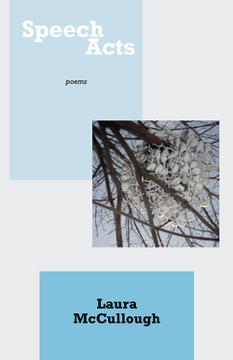
Speech Acts is Laura McCullough’s third collection of poetry with a fourth due soon from Alice James Books. Her previous collection, What Men Want, was reviewed in issue nine of The Potomac. Blowjobs was the short answer, to suggest the need for connection men seek. In this new one, blowjobs again play an important role, making an appearance in at least five poems. This is not to say that McCullough, who teaches full time at Brookdale Community College in New Jersey and is active in poetry and creative writing generally, has an unhealthy obsession with oral sex but that as a metaphor the blowjob has a vibrant and riveting power, an undeniable eroticism and great potential for outrageous, iconoclastic humor.
Indeed, McCullough’s poetry is vividly sensuous, and in the first of the three parts of this collection, which most directly reflects the book’s title, over and over McCullough ties words and speech to their physical actions and consequences, reminding us, keenly and lucidly, that poetry itself is at once an oral act and a written one — a “speech act,” indeed. In the delightful poem, “Giving Good Bard,” a man and a woman sit at an outdoor café discussing words for blowjobs while an older couple eavesdrops nearby. The woman describes the physical movements of the mouth as it utters the word, “fellatio,” the rounding of the lips, the dipping of the tongue, the touching of the teeth as the sibilants and the vowel sounds are made. While the older couple sits silently by — and one can only infer, hungrily taking it all in — she further elucidates the term “cock sucking,” as it is formed in the mouth and heard by the ear, the repeated hard “k,” the slide from the soft “o” into the softer “u” as the mouth widens. These are speech acts: how the words are performed.
Etymologies also play a part in speech acts, and in “Avocados” we learn that “fellatio” derives from the Latin word for “to suck milk from,” just as “avocado” is Spanish from the Aztec “ahuacatl,” meaning “testicle.” Similarly, in the poem, “Speaking Malagasy on the Isle of Vanilla,” which takes the island language of Madagascar to make its point about how language shapes our worlds, describes relationship and multiplicity — the world, again — the blowjob is mentioned as a metaphor for power. A man tells the poet he doesn’t trust women who give blow jobs; they’re all about control, he maintains. But the poet doesn’t buy this perspective and sees a much more complex involvement of control, surrender and dependence at work, subtleties that bind us in language just as surely as national economies are bound in relationships so intricate that they can never be as obvious as conspiracy theories would have us believe. “A Dirty Poem about Oral Sex” and “Statistics and Grace,” both from Part III, focus on other aspects of the blowjob — the ultimate intimacy and the giving of pleasure/pleasure of giving the act implies, and what these things mean to be fully and finally human.
McCullough’s poetry is vividly sensuous… over and over McCullough ties words and speech to their physical actions and consequences
“Speech acts” inform the first of the three parts of this collection. Interestingly, the only place the phrase is used is in the poem, “What I Was Trying Not to Say” — and here it is negative, the withholding of speech. In all of these poems, McCullough points out the intimate connections between language and behavior, all with sensuous overtones. “My Labial K” is a prime example. “Of K sounds there are a number: aspirated/palatalized, labialized, unreleased, voiced//and ejective.” “Begin with a Bifed Tongue,” “Pig’s Tail Tongue” and “The Elisionist” are others.
Indeed, there are more than blowjobs in Speech Acts, a thoughtful, wise and humorous assemblage indeed. Parts II and III share the same startling connections between things in the world that characterize the first part, but less to do with language than the creation of works of art themselves (the preoccupation of Part II) and the human being as a work of wonder (or art), the focus of Part III. Just as the phoneme is “the smallest unit of speech/that distinguishes meaning” (“What Is the Phoneme for Forgiveness?”), so in this third section McCullough takes us “Under the Bones,” shows us men with “Large Hands” and “Small Hands,” demonstrates “There’s/a connection between the throat/and vagina: tighten one, they both clench” (“What Can Happen in the Dunes”). Take the poem from Part II, “Something Small and Bright”: “Ghosts have taken over my face,” McCullough begins, and the poem goes on to describe something like Keats’ “negative capability,” shorthand for empathy: being inhabited by others. The creative process, in all its aspects, is the real overall theme of Speech Acts.
In a number of poems, McCullough brings attention to the fact that this is a poem we are reading, a post-modern touch. “This poem wants to be a world citizen…,” declares “This Poem Has Declared Itself Mundialized”; “I wanted a cement truck in this poem,” the poet confides at the outset of “The Orthography of Provocation”; “Just this//awful unmanifestation behind the poem’s tentacles,” “What I Was Trying Not to Say” elaborates; “They’re aware of being observed by us/in this poem,” we read in “A Dirty Poem about Oral Sex.” The effect here is to bring the reader’s attention to the poem as an artifice, and once again we are immersed in language as an act of speech, of showing and telling.
Laura McCullough is a “serious” poet, but her work is not Serious. It’s full of iconoclastic, irreverent humor and sly, intelligent observations that challenge and overturn traditionally accepted beliefs. Can anybody who writes a poem entitled, “There’s a Whore at My Table” be accused of being too somber, stern?

